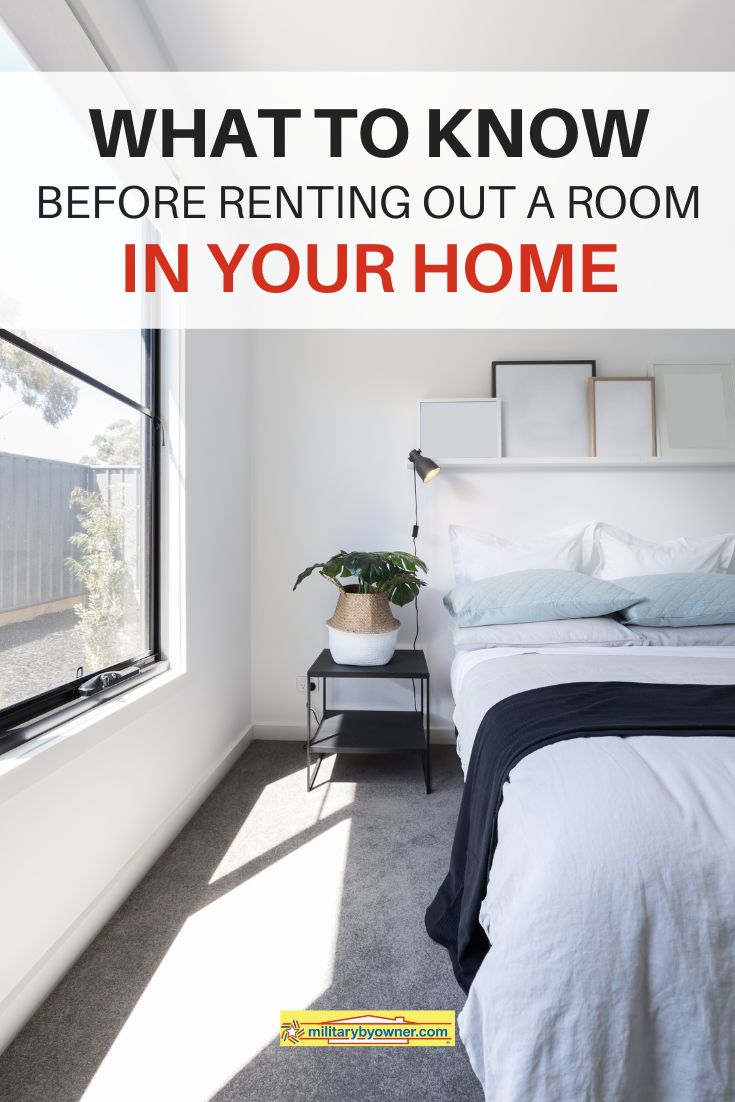
Photo from Canva
In this article:
Would you share a room in your home today to avoid sharing the title of your house with your mortgage lender for longer than necessary? Homeowners across the U.S. are doing just that! They are opening their property to tenants to help pay bills or pay down their mortgage more quickly.
The rapid growth of the sharing economy (Uber, Airbnb, Dog Vacay, ZipCar, to name a few) legitimizes the idea of renting out a room in your home for extra cash. As military families, we're already pretty familiar with sharing: we borrow goods from the loan locker on base before our household goods arrive, we give our used moving boxes to the next military family PCSing, and we sometimes find ourselves in need of renting a room in another military family's home.
Geobachelors, in particular, search for single rooms for rent, especially when they're supporting both the household at their current duty station and their family's home back at the last. To help meet this need for renting a room, MilitaryByOwner has added a "Room" feature. From your property results, choose “Refine Search” then “Home Type."
If you're renting out a room in your house, make sure to list your property type as "room" instead of a single family home or condominium to ensure those searching can find your room for rent.
Before you post that room for rent listing, though, take heed. Renting out a room and inviting strangers into your home definitely isn't for everyone.
Let's look at the top questions to answer before you rent out a room in your home.

Photo from Canva
1) What do I need to know about the legalities of a room for rent?
If this is your first time as a landlord, realizing there are laws about rooms for rent may come as a surprise. There are federal and local laws to consider, and they’re related to the marketing of your home, the lease, and the taxes you’ll have to pay on the income you’ve earned.
Your State’s Laws
You’ll want to invest in a state-specific landlord/tenant lease like those offered at U.S. Legal Forms. They cover each state and their specific rental agreement language. You may need to customize the wording to accommodate a room for rent vs. a house for rent. But, the major categories are covered, such as the application, lease, disclosures, termination notice for non-payment of rent, inventory reports, and salary verification.
Not only do state laws regarding rooms for rent differ across the country, but your local city, town, or municipality government could also have a say in how your business is operated. You should be on the lookout for how they govern occupancy, privacy, zoning laws, and even parking.
Federal Fair Housing Laws
Landlords must abide by the Federal Fair Housing Act, which protects classes of people from discrimination. The marketing and advertising used to find tenants cannot use discriminatory language to dissuade certain people from applying. These protected classes include race, color, religion, nationality and ethnic background, gender, familial status, and mental and physical disabilities. State and local laws may expand on these protected classes, for example, military status.
However, Federal Fair Housing laws involving a room for rent are unique regarding the relationship of the people living together as roommates. Legally, there are differences between renting a house to someone you don’t live with and renting a room to someone in a shared home.
Essentially, you cannot use discriminatory language in your ad, but you can advertise with qualifiers specific to your lifestyle, for example, a female owner who prefers a female roommate or a strictly religious person who seeks another who upholds the practices they engage in at home.
This change was instituted in 2012 and was mainly based on considering the invasion of privacy the homeowner would endure. “Because we find that the FHA doesn't apply to the sharing of living units, it follows that it's not unlawful to discriminate in selecting a roommate.”

Photo from Canva
Taxes
You probably guessed the income you earn from renting a room would be taxed. Yep, the IRS wants a piece of your rental income pie. But, as the landlord, you qualify for some tax benefits that allow your rental business to become profitable. Take a look at typical deductions.
- Advertising, listing, and service fees accrued from companies such as Airbnb.
- Mortgage interest
- Utilities
- Repairs and maintenance for the room and shared furniture and appliances
- Cleaning fees for laundry and the room
- Property insurance
2) Are you comfortable with the administrative tasks and responsibilities of landlord life?
If you are renting out your entire property but don't want to handle the landlord's administrative tasks, you can hire a property manager. But if you're living in your home as the landlord, then you are the property manager. Are you prepared for the task?

Photo from Canva
Check out our blog post 8 Lessons for a First Time Landlord to better understand what's involved. Essentially, you should be prepared for the following tasks when renting out a room in your home:
- Perform a background and credit check on applicants.
- Execute a lease.
- Mandate that your tenant maintains renters insurance.
- Collect rent, and follow up according to the law when rent is late.
- Keep records of income and expenses that pertain to your rental.
The background check is critical for military families. You don't want the short-term financial gain of renting out a room negatively impacting your long-term career prospects. Verify you aren't allowing a criminal into your home before you have to report the incident on your next security clearance.
A lease is an absolute must in a roommate situation. Since this individual will be living in your primary residence, he can claim legal rights to your home if you don't have anything in writing that draws up a clear delineation of his status as a tenant.
You don't want to have to take your tenant to court because he's claiming squatter's rights when you try to sell your home when orders arrive. Do you think your last PCS was stressful? Get a lease in plain simple language to avoid this mess!
back to top
3) What are your HOA restrictions?
In response to the Great Recession of 2007-2009, there was a slow but steady growth in the number of homeowners in high-end neighborhoods who added paying tenants to their homes. The hurting economy had significantly affected the owners’ abilities to pay the mortgages on their mansions and utility bills.
As a result of the proliferation of these boarding houses, homeowners associations moved quickly to enforce stricter tenancy restrictions, such as the amount of time non-family members can reside in the property. HOAs and management companies around the country followed suit; many didn't like the idea of people moving in and out of their neighborhoods every few months, believing that it created a destabilizing effect on the overall community.
HOAs not only legislate policies on traditional single family homes but also regulate condos and townhouses, likely with more stringent rules about additional tenants to protect all occupants of the complex.

Photo from Canva
If you live within a HOA’s jurisdiction, check the policies before adding renters to your home. A real estate agent familiar with your area should be able to better advise you on any zoning restrictions or policies that would otherwise prohibit you from renting out a room.
4) Is the room adequately prepared for a paying tenant?
Legally, the room must be habitable, meaning it has to meet health and building codes, including the absence of mold. As the landlord, you have to ensure your tenant’s comfort and safety through working heating and air conditioning, functional windows, and access to a bathroom.
There are preparations beyond safety standards that are needed to attract the most qualified renters. Many room renters are interested in simplifying life and hope to find an updated, furnished bedroom. To justify asking the market’s highest rental prices, you’ll need to supply the room with quality amenities, from linens and floor coverings to updated paint and curtains. Don’t forget to document the room’s condition with pictures before and after the tenant moves in.
5) Can you set house rules and hold to them?
Before your tenant rearranges your furniture and takes over the pantry, make sure to lay some ground rules. One way to help you achieve house rules is to create a list and keep it posted in a clear, visible place, such as on the front of the refrigerator.
House rules may include items such as:
- No smoking inside the home.
- Rinse and put your dishes in the dishwasher.
- No male/female house guests (as appropriate).
- No overnight house guests without approval.
- Don't turn the AC below 72 degrees.
6) How important is cleanliness to you?

Photo from Canva
If you describe yourself as an obsessive neat freak, then coming to terms with having a less than immaculate home may present a challenge. On the other hand, if your renter is coughing up enough dough to cover more than half of your mortgage, you may be able to afford to splurge on help with housekeeping.
You have to weigh the cost-benefit ratio of not knowing the exact living habits of your roommate. Can you deal with someone who doesn't prioritize picking up after themselves in exchange for making thousands of dollars in rent over the year?
Now that you've read about some of the critical factors of renting out a room in your home, would you consider joining the sharing economy by renting a room in your home? If you have experience in this situation, we’d love to hear your tips for other military families considering sharing their space!
Take a look at our detailed FREE resource for military landlords below.


back to top